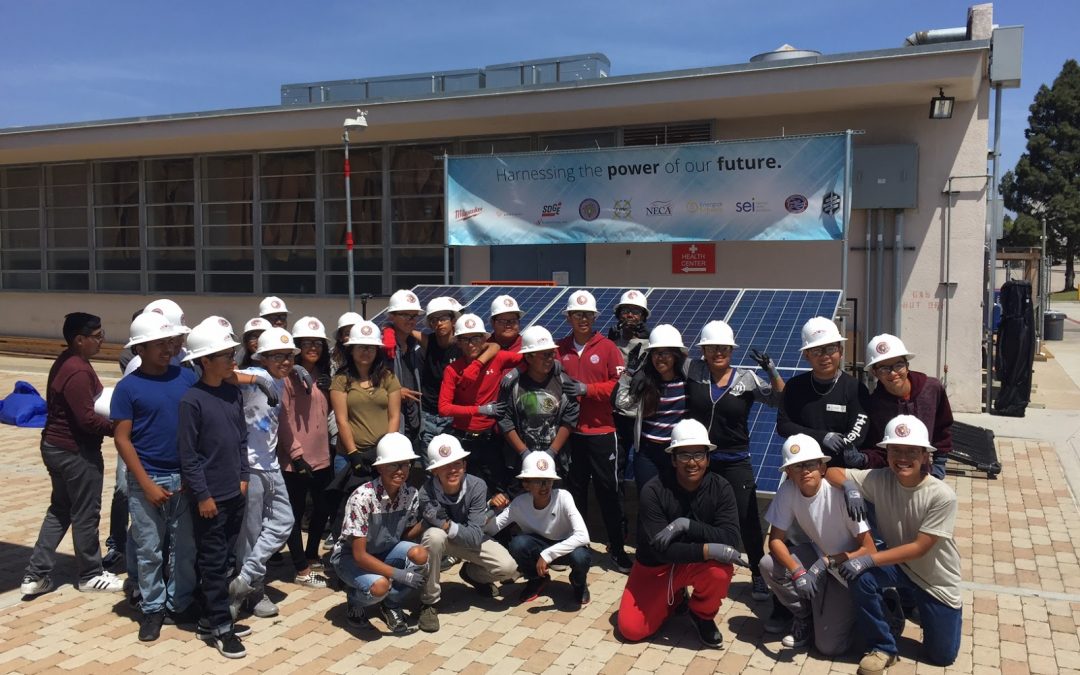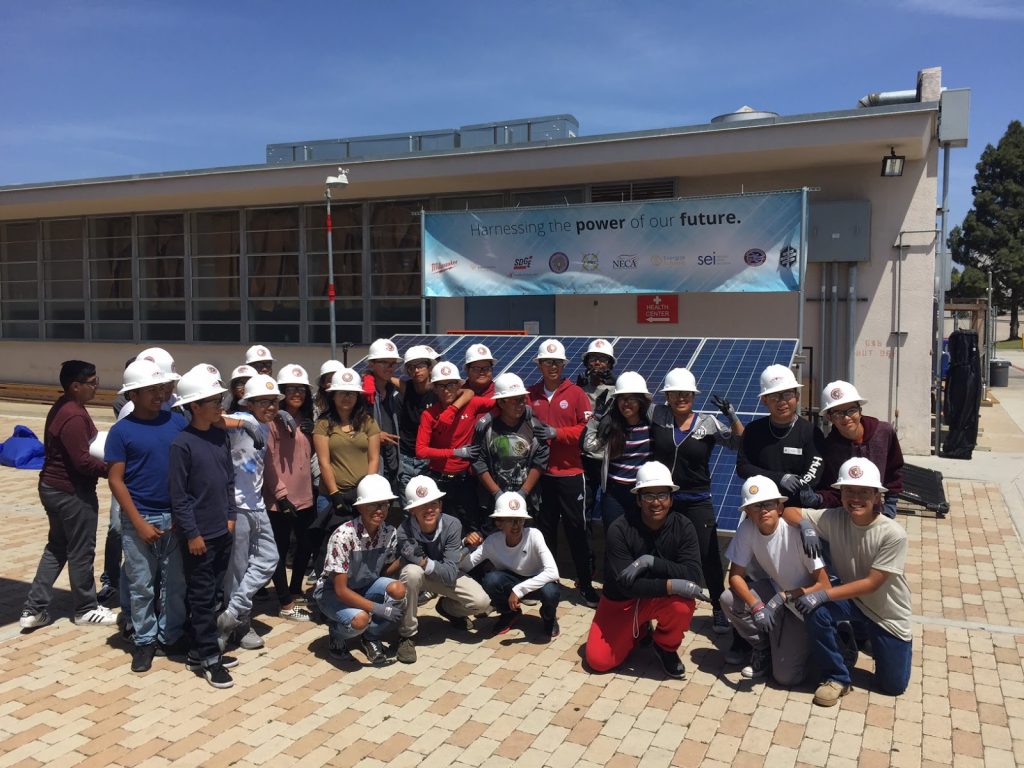By. Tyler Valdes and Liz Fitzpatrick
At Hoover High School’s Sustainable Academy of Building and Engineering (SABE), science, mathematics, history, and English are woven together in a cutting-edge green career training program that includes professional mentorships, job shadowing, and job-site field trips to empower students to develop strong green career and workforce readiness skills. Over 90% of Hoover students are socioeconomically disadvantaged and 98% identify as BIPOC (Black, Indigenous, or Person of Color).
At SABE, students spearhead projects that integrate place-based learning to solve problems in their local community of City Heights, California. Project highlights include:
- The Plastic Pollution Solution: Students researched clean water access in lower-income communities and the overuse of plastics worldwide for a project that culminated in the installation of a refillable water bottle station in the Hoover High School library, along with a display case that educates their peers about plastic pollution and how to reduce plastic water bottle use.
- Growing Food Locally: Students addressed the critical issue of living in a food desert (which most students at Hoover face) by installing community gardens and aquaponics systems.
- Housing First: Students worked with the nonprofit Humble Designs to build furniture and planter boxes for the San Diego Housing Commission’s homelessness action plan, Housing First, a funding and housing strategy that has created thousands of housing opportunities for individuals and families experiencing homelessness.
- Eco Carts: Students built eco carts to transport locally grown produce to local farmers’ markets, reducing the carbon footprint of produce transportation.
- Solar Powered Community Station: Students worked with a local community Wi-Fi and refreshment hub at one of San Diego’s open air markets to build a structure for the café and install solar panels to provide power and Wi-Fi access.
Community partnerships enhance the learning of SABE students by providing an authentic and locally impactful reason to learn and develop knowledge while cultivating work-based communication skills. “The real-world focus motivates students because they enjoy bettering their community,” said Angela Hummel, director of SABE. Student motivation is often increased when they are accountable to community and industry partners and engage in real-world projects outside the classroom. For example, business and community partners examine and score SABE student work that is submitted for competitions. SABE students have won many awards for community-based projects that give back to the City Heights community. In May 2019, SABE tenth-grade students won “Best Veteran Project” at San Diego Unified School District’s (SDUSD) annual Career and College Technical Education (CCTE) Showcase for their work on food deserts and promoting water conserving aquaponics systems in the community. Over 40 projects from SDUSD schools were represented at the showcase. In May 2020, SABE ninth-grade students won “Coolest Project” at the CCTE Showcase for their Plastic Pollution Solution water station project. As an academy, SABE was recognized by the California Department of Education as a 2020 California Distinguished Partnership Academy, an award only 10% of academies have received in 35 years.
“SEI is the ‘VIP’ of industry partners for the SABE program,” said Hummel. Over the last six years, SEI has worked closely with SABE to support Career Technical Education (CTE) teachers in enriching their students’ learning experiences with career-connected curriculum and hands-on projects. During that time, SEI has served on the SABE Advisory Board and provided industry connections, work-based learning opportunities, CTE course curriculum, teacher training, instructional planning support, and direct co-instruction for career-based learning. For example, SEI collaborated with the San Diego Electrical Workers Minority Caucus of the International Brotherhood of Electrical Workers to facilitate a student-conducted mobile ground-mounted solar installation on campus.
SEI also supported SABE in developing a technical sustainable energy learning pathway at their school. For five years, SABE teachers have taught SEI’s Innovations in Green Technology (IGT) course, a year-long course that is approved by the University of California to help students get into public universities and is designed to meet California CTE Standards for the Energy, Environment, and Utilities sector. The course introduces students to career opportunities in sustainable STEM fields through a series of projects, including wind turbine design, making electrical circuits, creating solar cars, and energy auditing. “The work focuses on finding solutions to our most pressing problems. Students naturally engage with these hands-on projects…they see the connections in their academic courses and have a reason to come to school. Plus, they like the projects and have fun!” said Hummel.
Every year, SEI staff members attend the summer SDUSD Project-Based Learning Institute where they work with educators, including SABE teachers, to plan year-long projects for each grade level. These projects focus on technical sustainability solutions that help their local community. For example, SEI worked with SABE’s tenth-grade teacher team to develop a project where students create portable, solar-powered UV and carbon water filters for homeless community members. Each spring, students have the opportunity to present their projects to over 150 of their peers from other high schools and hear from professionals in green careers at SEI’s annual Green Careers Conference.
While distance learning has posed many challenges to educators and students across the country and the globe, SABE educators have demonstrated resilience and resolve to continue providing their students with meaningful learning experiences. One of the biggest lessons the SABE team learned during distance learning was the importance of prioritizing student social and emotional well-being by providing opportunities to communicate and socialize with each other and their teachers. To accomplish this, SABE teachers leveraged various online resources and tools such as Google Docs and Zoom to host guest speakers, industry partner demonstrations, and Student Advisory Board-led virtual activities to keep morale up for the SABE community. Recently, in part through support from Trane Technologies Foundation, SEI collaborated with ninth-grade teachers to deliver the IGT curriculum to over 100 students via distance learning. To supplement the online lessons and increase engagement, students were provided with electrical circuit kits and were connected through a live interactive webinar to a local green professional in the trades, who inspired students with their career journey and advice. While Hummel recognizes that distance learning can be inferior to in-person, project-based learning, she continues to embrace place-based learning as an opportunity for students to become engaged in solving real-world problems in their community.
Author Bios
Tyler Valdes supports SEI’s K-12 educational programming in San Diego, including Energize Schools and Energize Colleges. Tyler comes to SEI with a strong background in sustainability, environmental education, and climate science communications. As an early-career professional, Tyler has experience working for universities, nonprofits, and local government supporting cultural and behavioral change through educational programming. During his graduate studies, Tyler served as the UC San Diego Carbon Neutrality Initiative Student Engagement Fellow and as an intern with the Port of San Diego’s Energy and Sustainability team. Previously, Tyler served at the UC Irvine Sustainability Resource Center where he managed innovative student projects and programs that advanced community resilience to climate change. Tyler holds a bachelor’s degree in Earth System Science from UC Irvine and a master’s degree in Climate Science and Policy from Scripps Institution of Oceanography, UC San Diego.
Liz Fitzpatrick manages SEI’s Southern California workforce education and training programs from her base in San Diego. She is a technical education specialist, working on the Energize Schools, Energize Colleges, and Climate Corps programs to support students, teachers, faculty, interns, and fellows to create leaders in the new green energy workforce. Prior to joining SEI, Liz worked for environmental consulting, remediation, and engineering design firms. In her previous position, Liz was an environmental engineer at Good Earthkeeping Organization where she focused on initial project design and reporting for gas thermal remediation projects internationally. Liz then traveled in Southeast Asia and spent time volunteering with Save Elephant Foundation in Thailand where she taught local children about sustainable practices. Liz received a Bachelor of Science degree in Environmental Engineering from the University of Connecticut and is a registered Engineer in Training.



